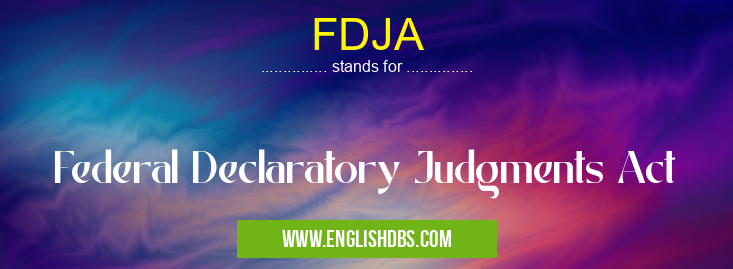What does FDJA mean in UNCLASSIFIED
The Federal Declaratory Judgments Act (FDJA) is a United States federal statute that permits the federal courts to issue declaratory judgments in certain cases. A declaratory judgment is a legal decree that declares the rights and obligations of parties to a dispute without resolving the underlying controversy.

FDJA meaning in Unclassified in Miscellaneous
FDJA mostly used in an acronym Unclassified in Category Miscellaneous that means Federal Declaratory Judgments Act
Shorthand: FDJA,
Full Form: Federal Declaratory Judgments Act
For more information of "Federal Declaratory Judgments Act", see the section below.
Key Points
- The FDJA was enacted in 1934 to provide a mechanism for parties to obtain a judicial determination of their rights and obligations without having to engage in costly and time-consuming litigation.
- The FDJA applies to cases where there is an actual controversy between adverse parties and where the court has jurisdiction over the subject matter of the dispute.
- The FDJA does not require the parties to have suffered any actual harm or injury.
- Declaratory judgments are binding on the parties and can be enforced by the court.
Benefits of the FDJA
- Provides parties with a mechanism to obtain a judicial determination of their rights and obligations without having to engage in costly and time-consuming litigation.
- Can help to avoid unnecessary litigation by providing parties with a clear understanding of their rights and obligations.
- Can be used to resolve disputes before they escalate into more serious conflicts.
Essential Questions and Answers on Federal Declaratory Judgments Act in "MISCELLANEOUS»UNFILED"
What is the Federal Declaratory Judgments Act (FDJA)?
The Federal Declaratory Judgments Act (FDJA) is a federal law that allows federal courts to issue declaratory judgments. A declaratory judgment is a court order that declares the rights and legal relations of parties to a case without ordering any specific action.
What are the requirements for obtaining a declaratory judgment under the FDJA?
To obtain a declaratory judgment under the FDJA, the following requirements must be met:
- The case must be a "case of actual controversy."
- The controversy must be "ripe" for adjudication.
- The court must have jurisdiction over the case.
What are the benefits of obtaining a declaratory judgment?
There are several benefits to obtaining a declaratory judgment, including:
- It can help to resolve disputes before they escalate into more costly and time-consuming litigation.
- It can provide certainty and predictability regarding the parties' rights and obligations.
- It can help to avoid unnecessary litigation by clarifying the legal issues involved in a dispute.
What are the limitations of the FDJA?
The FDJA does not apply to all cases. For example, it does not apply to criminal cases or to cases involving injunctions or mandamus. Additionally, the FDJA does not create a new cause of action. It simply provides a procedural mechanism for obtaining a declaratory judgment.
How do I file a declaratory judgment action?
To file a declaratory judgment action, you must file a complaint with the appropriate federal court. The complaint must state the facts of the case and the legal grounds for your claim. You must also serve the complaint on the other parties to the case.
Final Words: The FDJA is a valuable tool that can be used to resolve disputes and provide parties with a clear understanding of their rights and obligations. The FDJA is a valuable tool that can be used to resolve disputes and provide parties with a clear understanding of their rights and obligations.
